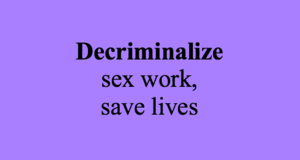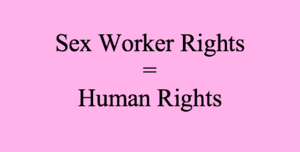Course:GRSJ 224/Sexual and Reproductive Health Needs of Sex Workers
Sexual and Reproductive Health Needs of Sex Workers
Criminalization of Sex Workers and Sexual and Reproductive Health
Individuals employed as sex workers are constantly facing the threat of criminalization. This threat causes limitations to “access of health services” (Overs and Hawkins 2). Even if there are not direct laws prohibiting sex work, there are other factors that cause imprisonment. For example, “transgender and male sex workers are often subject to laws against homosexuality or obscenity” (3). In addition, sex workers are sometimes criminalized for other reasons, such as loitering, in attempt to cover up the true discriminatory reasons for their arrests. It can even get to the point where sex works are “banned from entering several countries including Japan and the United States of America” (3) because of their choice of work. These occurrences dehumanize sex workers, “rendering them vulnerable to exploitation, invisibilising abuses, limited access to work, and [finally], denying them the economic, cultural, and social rights conferred by citizenship” (4). Sex workers must stop being seen as criminals and therefore must have access to “safe, clean and fair workplaces” (8).
Access to Sexual and Reproductive Health Needs
Similarly to what is mentioned above, in Brazil, sex workers are not arrested for prostitution but instead are arrested for “vagrancy or obscene behaviour” (Chacham et al. 109). In addition to the threat of being imprisoned, sex workers are also at risk of coming in contact with sexually transmitted diseases, such as HIV. A study held in Brazil interviewed various sex workers about their experiences in their career. During this interview, “60% of [the sex workers] considered themselves at very high risk of contracting HIV” (112). For those who purchase condoms, the ones bought are often “very low quality in large amounts to save money” (112). This practice of needing to save money often leads to condom breakage, which escalates into further problems for sexual and reproductive health.
It is common for minors to fake documents regarding their age in order to practice sex work. These younger women are especially at health risks as it is documented that younger sex workers are more likely to turn to substances in order to escape from their “moral conflicts over sex work” (112). Also, these less experienced women would fail to notice possible weapons in their room that could be used against them such as knives, leading to further health risks.
Services Available for Sex Workers
Information about sexual and reproductive health must be available to all sex workers. These resources would include “information and counselling on sexuality” in addition to instruction on the “prevention and treatment of STDs and AIDS” (116), something that is a crisis in the sex work industry. In addition to access to educational resources, there must be services available to help in situations of need such as access to abortion clinics that are safe, care during both pre and post birth, as well as mental health services and rehabilitation centres for drug and alcohol abuse (116).
In a group discussion among sex workers in Cambodia, it became clear that there was a lack of educational resources. There was limited “knowledge about sexuality and reproductive health” (Delvaux et al. 90), including the biology of reproductive organs and reproductive processes such as menstruation. Shockingly, only 18% of women in [this] interview had ever used modern contraceptive methods, including birth control pills and injections. However, impregnation is still considered a hardship due to the cost of abortions, the cost of taking time off of work, and the abortion process but them “at risk of complications” (90).
Conclusion
It is crucial for resources to be available for sex workers as they are humans and deserve access to the same basic rights that any other citizen is able to obtain. If offered adequate sexual and reproductive health resources, it is possible that both the transmission of sexually transmitted infections and the number of unwanted pregnancies could decrease significantly. Sex workers are often forced into difficult situations, where their safety status is unknown. If they are given these resources and shown that they are valued members of our society, there is a chance that these dangerous scenarios will decrease. This would occur as the decrease in stigmatization of sex workers would likely also lessen the need to cover up their method of employment.
Links
https://journals.plos.org/plosone/article?id=10.1371/journal.pone.0219813
https://www.ncbi.nlm.nih.gov/pubmed/29328511
https://www.ncbi.nlm.nih.gov/pmc/articles/PMC5498862/
https://www.nswp.org/sites/nswp.org/files/bp_sws_access_to_comp_srh_-_nswp_2018.pdf
https://bmcwomenshealth.biomedcentral.com/articles/10.1186/s12905-018-0601-5
https://www.srhweek.ca/providers/people-and-communities/sex-workers/
Works Cited
Chacham, Alessandra S., et al. “Sexual and Reproductive Health Needs of Sex Workers: Two Feminist Projects in Brazil.” Reproductive Health Matters, 2007, pp. 108-118, DOI: 10.1016/S0968-8080(07)29292-4
Delvaux, Thérèse., et al. “The Need for Family Planning and Safe Abortion Services among Women Sex Workers Seeking STI Care in Cambodia.” Reproductive Health Matters, 2003, pp. 88-95, DOI: 10.1016/ S0968-8080(03)02163-3
Overs, Cheryl, and Kate Hawkins. “Can rights stop the wrongs? Exploring the connections between framing of sex workers’ rights and sexual and reproductive health.”, BMC International Health & Human Rights, 2011, pp. 2-8, DOI:10.1186/1472-698X-11-S3-S6

